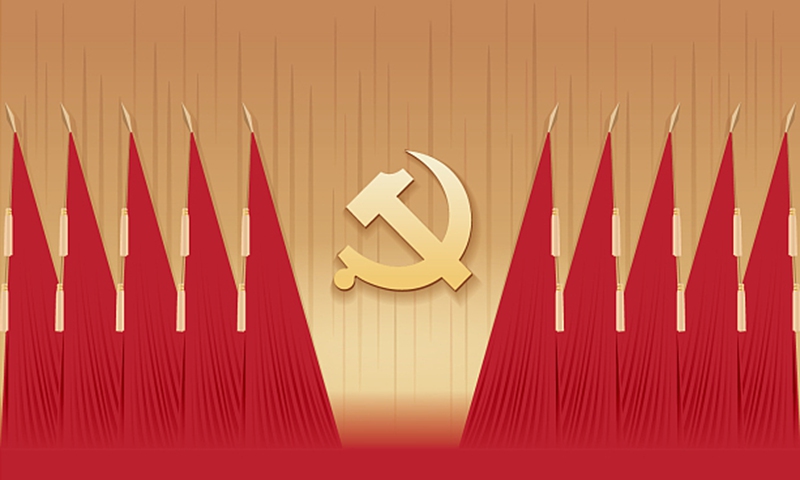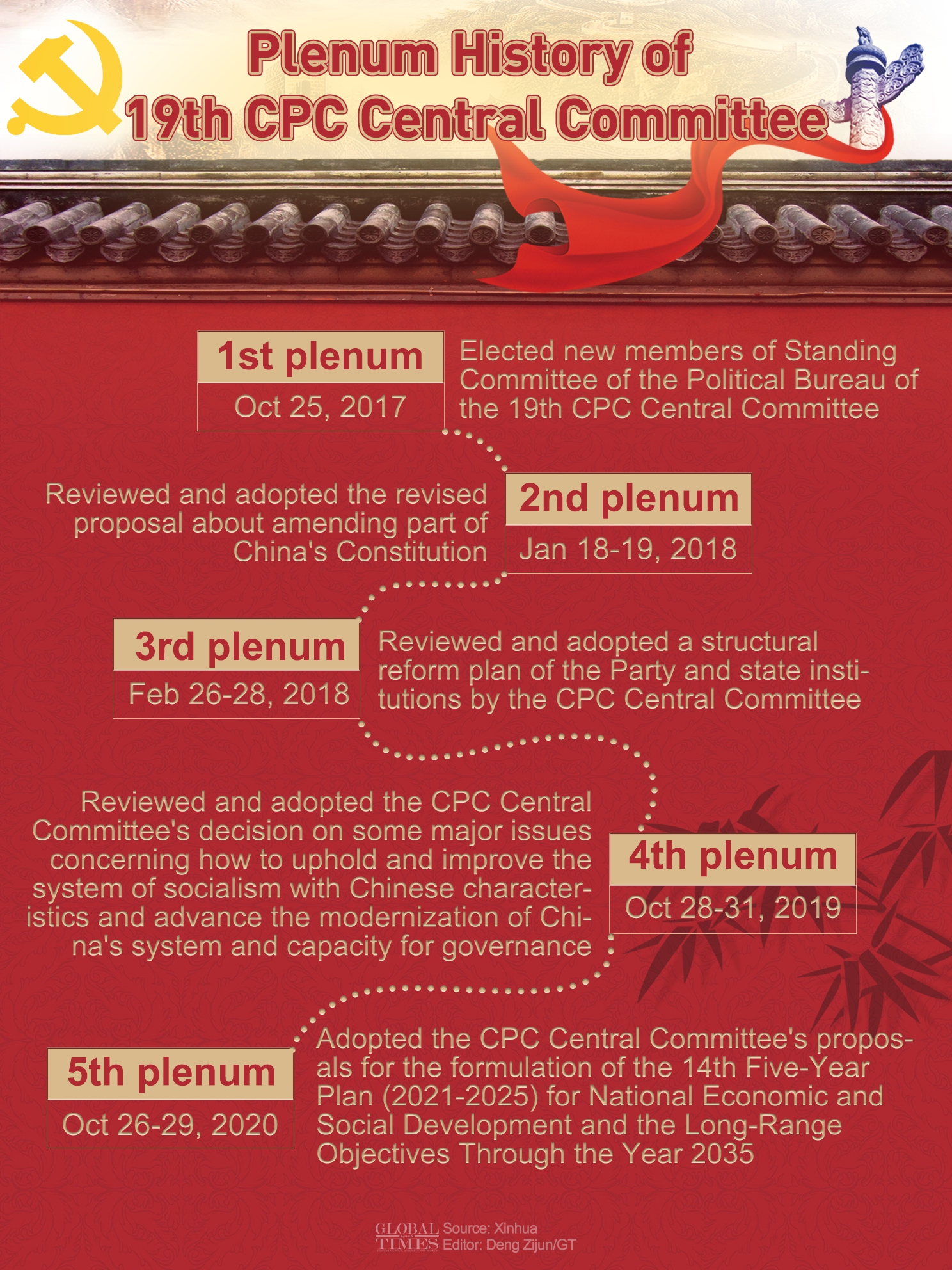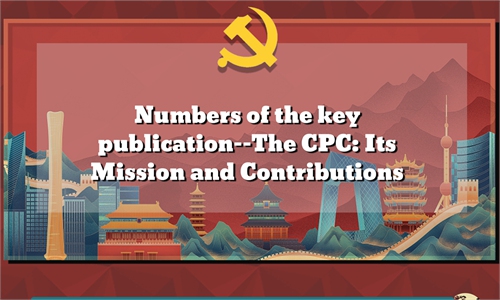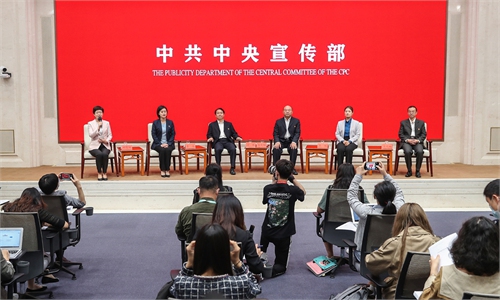
Photo:CFP
The sixth plenary session of the 19th Central Committee of the Communist Party of China (CPC) kicked off on Monday. Xi Jinping, general secretary of the CPC Central Committee, delivered a work report on behalf of the Political Bureau of the CPC Central Committee and made explanations on a draft resolution on the major achievements and historical experience of the CPC's 100 years of endeavors. The sixth plenary session will conclude on Thursday. Plenum History of 19th CPC Central Committee. Infographic: Deng Zijun/Global Times 6th Plenum of 19th CPC Central Committee. Infographic:Deng Zijun/Global Times
The document is set to look back at key events in the Party's 100-year history, reinforce unity among the Party and strengthen the authority and leadership of the CPC Central Committee with Xi at its core, as well as determine the Party's direction for the next few decades, said Chinese political analysts.
The People's Daily published a poster on its WeChat public account Sunday outlining the significance of the sixth plenary session, and stating that the resolution will answer two key questions - "Why were we successful in the past? How can we continue to succeed in the future?"
These are quotes from the keynote speech made by Xi on July 1 at the ceremony marking the centenary of the CPC held at Tian'anmen square. In the speech, Xi said "Looking back on the Party's 100-year history, we can see why we were successful in the past and how we can continue to succeed in the future. This will ensure that we act with greater resolve and purpose in staying true to our founding mission and pursuing a better future on the new journey that lies before us."
Chinese experts on the Party's history and politics said that the timing of the sixth plenary session of the 19th CPC Central Committee is crucial as it's the Party's first major political event after its 100th founding anniversary, and the resolution that will be tabled at this historic juncture will have a profound effect on China and even the world.
The CPC plans to achieve national rejuvenation through two goals, known as "two centenaries." Over the past nine years, "as the Party's most senior leader, Xi has led the country in completing the first step (the realization of a moderately prosperous society in all respects), and chaired the design of the second step of this historic plan," the Xinhua News Agency said in an article titled "Xi Jinping, the man who leads CPC on new journey."
To realize the second step of national rejuvenation, "First, socialist modernization should be 'basically realized' by 2035, and second, China should be built into a great modern socialist country that is prosperous, strong, democratic, culturally advanced, harmonious, and beautiful by the middle of the 21st century, which will be around the centenary of the PRC" in 2049, Xinhua said in the article.
After realizing a moderately prosperous society in all respects this year, China is ready to launch another sprint toward its historic goal of rejuvenation, and at this point, experts said that the Chinese people have the highest confidence and approval in the past 100 years in both China's political system and Chinese history and traditional culture.
This has especially been the case in recent years, with the country's successful handling of the COVID-19 pandemic, dealing with a series of provocations and offensives unilaterally launched by the US in the fields of trade, geopolitics and high-tech, and after witnessing the poor performance of major Western countries in handling global challenges and internal problems, Chinese people's confidence, patriotism, and especially approval of the CPC, are at their highest point, said observers.
This makes it an ideal opportunity for the CPC to conduct a grand review to objectively, honestly and broadly sum up its 100-year history, said analysts.

Third 'resolution on history'
The most anticipated part might be the period after the reform and opening-up, which kicked off in 1978, as the two resolutions in 1945 and 1981 already summed up previous parts of CPC's history, so the new resolution won't change the previous contents and conclusions, said Wu Xinwen, a professor and expert on Marxism at Fudan University in Shanghai.
In the 100-year history of the CPC, there have been two "resolutions on history" with the first - the Resolution on Certain Issues in the History of the CPC — issued in April 1945, four years before the founding of the People's Republic of China (PRC) in 1949 and a few months ahead of victory in the War of Resistance against Japanese Aggression (1931-45), as well as World War II. It was issued by the Party under the leadership of the central committee with Mao Zedong at its core.
The second such pivotal document - The Resolution on Certain Questions in the History of the CPC Since the Founding of the People's Republic of China - was issued in 1981, about three years after the beginning of reform and opening-up and five years after the end of the Cultural Revolution in 1976.
Wang Junwei, a research fellow at the Institute of Party History and Literature of the CPC Central Committee, said that the two documents in the past have had profound and long-term effects on "unifying the thoughts and concentrating the strengths of the whole Party," and "this is what we expect from the sixth plenary session of the 19th CPC Central Committee."
"The third resolution is highly anticipated as it is crucial for the Party to reach a consensus on important historical questions and to inspire its members to forge ahead," said Yang Xuedong, a professor of political science at Tsinghua University.

Unify the Party, guide the future
"In the long-term fight against both Leftist and Rightist tendencies," the Party made its position clear in the first resolution in 1945 and the second one in 1981. "The two resolutions document grave problems and mistakes in the history of the Party. They analyze the root causes and draw objective conclusions regarding important historical events and figures. In this way, the whole Party has come to a clear consensus on its past and thus grown stronger in unity," according to The CPC: Its Mission and Contributions, a publication released by the Publicity Department of the CPC Central Committee on August 26.
Wu told the Global Times on Sunday that the first one in 1945 sought to sum up the experiences of revolution, and to sum up the lessons that should be learned from the failures in fighting the KMT, Japanese aggressors and other enemies, as well as a series of internal problems, such as Leftist and Rightist tendencies that caused tragedies for the CPC since the Party's founding in 1921. "It paved the way for the 7th CPC National Congress, which was held in April 1945, the same month that the resolution was passed."
The second resolution in 1981 was to sum up the experiences of the "first 30 years" of the PRC, and to "find out the rights and wrongs" of governance from 1949 to 1981, bring a clear conclusion to the Cultural Revolution and guide direction for the reform and opening-up, and pave the way for the 12th CPC National Congress, which was held in 1982, Wu noted.
"The third one will be similar in its significance and functions — to have a clear and authoritative conclusion on a series of questions or issues in history, and pave the way for the 20th CPC National Congress next year," Wu said, adding that this one will cover more content compared to the previous two, as it aims to review and sum up the Party's 100-year history.
The previous two resolutions in 1945 and 1981 focused on solving question about the Party's line, to correct the mistakes caused by Leftist or Rightist tendency and unify the thoughts among Party members, and the third one is to reinforce the line which has been proved correct already, said analysts.
Wu noted that due to the change and development of the internal and external situations, there still have some other voices or unnecessary debates on some specific questions, and this time, the CPC will take the chance to make clear and reaffirm on some points and principles, to prove the maturity of the path that has already been selected.
"No matter how correct and mature the line is, there will always be questions and discussions within or outside the Party from time to time, so the CPC needs to continually strengthen the narrative and to give authoritative conclusion on certain questions to keep pace with the times," he said.
The world is experiencing a profound change which has not been seen in the past century, and the challenges that the CPC and China are facing are also unprecedented, and as the previous two resolutions have already summed up the history from 1921 to 1981, the third one needs to focus on the era after the reform and opening-up, which more directly affects the present and is more significant in guiding the CPC in fixing problems and overcoming challenges, said analysts.
Yang said the sixth plenary session usually focuses on ideology, Party building and the Party's style of work, and he predicted that this session would bring about important consensus on major problems and questions related to the policies of the reform and opening-up.
Wu said that China is currently facing very special challenges in this era. "Internally, it's just as the report of the 19th CPC National Congress said: there is a contradiction between unbalanced and inadequate development and the people's ever-growing needs for a better life; externally, we are facing increasing suppressions from the West, especially the US."
The third "resolution on history" will not just bring a conclusion to certain questions of history, but also find answers for the CPC to resolve and overcome new challenges, to find out the key that made the Party win the hard struggles in the past, and to give direction to the Party in the new stage of history, said experts.

Photo:CFP
The sixth plenary session of the 19th Central Committee of the Communist Party of China (CPC) kicked off on Monday. Xi Jinping, general secretary of the CPC Central Committee, delivered a work report on behalf of the Political Bureau of the CPC Central Committee and made explanations on a draft resolution on the major achievements and historical experience of the CPC's 100 years of endeavors. The sixth plenary session will conclude on Thursday. Plenum History of 19th CPC Central Committee. Infographic: Deng Zijun/Global Times 6th Plenum of 19th CPC Central Committee. Infographic:Deng Zijun/Global Times
The document is set to look back at key events in the Party's 100-year history, reinforce unity among the Party and strengthen the authority and leadership of the CPC Central Committee with Xi at its core, as well as determine the Party's direction for the next few decades, said Chinese political analysts.
The People's Daily published a poster on its WeChat public account Sunday outlining the significance of the sixth plenary session, and stating that the resolution will answer two key questions - "Why were we successful in the past? How can we continue to succeed in the future?"
These are quotes from the keynote speech made by Xi on July 1 at the ceremony marking the centenary of the CPC held at Tian'anmen square. In the speech, Xi said "Looking back on the Party's 100-year history, we can see why we were successful in the past and how we can continue to succeed in the future. This will ensure that we act with greater resolve and purpose in staying true to our founding mission and pursuing a better future on the new journey that lies before us."
Chinese experts on the Party's history and politics said that the timing of the sixth plenary session of the 19th CPC Central Committee is crucial as it's the Party's first major political event after its 100th founding anniversary, and the resolution that will be tabled at this historic juncture will have a profound effect on China and even the world.
The CPC plans to achieve national rejuvenation through two goals, known as "two centenaries." Over the past nine years, "as the Party's most senior leader, Xi has led the country in completing the first step (the realization of a moderately prosperous society in all respects), and chaired the design of the second step of this historic plan," the Xinhua News Agency said in an article titled "Xi Jinping, the man who leads CPC on new journey."
To realize the second step of national rejuvenation, "First, socialist modernization should be 'basically realized' by 2035, and second, China should be built into a great modern socialist country that is prosperous, strong, democratic, culturally advanced, harmonious, and beautiful by the middle of the 21st century, which will be around the centenary of the PRC" in 2049, Xinhua said in the article.
After realizing a moderately prosperous society in all respects this year, China is ready to launch another sprint toward its historic goal of rejuvenation, and at this point, experts said that the Chinese people have the highest confidence and approval in the past 100 years in both China's political system and Chinese history and traditional culture.
This has especially been the case in recent years, with the country's successful handling of the COVID-19 pandemic, dealing with a series of provocations and offensives unilaterally launched by the US in the fields of trade, geopolitics and high-tech, and after witnessing the poor performance of major Western countries in handling global challenges and internal problems, Chinese people's confidence, patriotism, and especially approval of the CPC, are at their highest point, said observers.
This makes it an ideal opportunity for the CPC to conduct a grand review to objectively, honestly and broadly sum up its 100-year history, said analysts.

Third 'resolution on history'
The most anticipated part might be the period after the reform and opening-up, which kicked off in 1978, as the two resolutions in 1945 and 1981 already summed up previous parts of CPC's history, so the new resolution won't change the previous contents and conclusions, said Wu Xinwen, a professor and expert on Marxism at Fudan University in Shanghai.
In the 100-year history of the CPC, there have been two "resolutions on history" with the first - the Resolution on Certain Issues in the History of the CPC — issued in April 1945, four years before the founding of the People's Republic of China (PRC) in 1949 and a few months ahead of victory in the War of Resistance against Japanese Aggression (1931-45), as well as World War II. It was issued by the Party under the leadership of the central committee with Mao Zedong at its core.
The second such pivotal document - The Resolution on Certain Questions in the History of the CPC Since the Founding of the People's Republic of China - was issued in 1981, about three years after the beginning of reform and opening-up and five years after the end of the Cultural Revolution in 1976.
Wang Junwei, a research fellow at the Institute of Party History and Literature of the CPC Central Committee, said that the two documents in the past have had profound and long-term effects on "unifying the thoughts and concentrating the strengths of the whole Party," and "this is what we expect from the sixth plenary session of the 19th CPC Central Committee."
"The third resolution is highly anticipated as it is crucial for the Party to reach a consensus on important historical questions and to inspire its members to forge ahead," said Yang Xuedong, a professor of political science at Tsinghua University.

Unify the Party, guide the future
"In the long-term fight against both Leftist and Rightist tendencies," the Party made its position clear in the first resolution in 1945 and the second one in 1981. "The two resolutions document grave problems and mistakes in the history of the Party. They analyze the root causes and draw objective conclusions regarding important historical events and figures. In this way, the whole Party has come to a clear consensus on its past and thus grown stronger in unity," according to The CPC: Its Mission and Contributions, a publication released by the Publicity Department of the CPC Central Committee on August 26.
Wu told the Global Times on Sunday that the first one in 1945 sought to sum up the experiences of revolution, and to sum up the lessons that should be learned from the failures in fighting the KMT, Japanese aggressors and other enemies, as well as a series of internal problems, such as Leftist and Rightist tendencies that caused tragedies for the CPC since the Party's founding in 1921. "It paved the way for the 7th CPC National Congress, which was held in April 1945, the same month that the resolution was passed."
The second resolution in 1981 was to sum up the experiences of the "first 30 years" of the PRC, and to "find out the rights and wrongs" of governance from 1949 to 1981, bring a clear conclusion to the Cultural Revolution and guide direction for the reform and opening-up, and pave the way for the 12th CPC National Congress, which was held in 1982, Wu noted.
"The third one will be similar in its significance and functions — to have a clear and authoritative conclusion on a series of questions or issues in history, and pave the way for the 20th CPC National Congress next year," Wu said, adding that this one will cover more content compared to the previous two, as it aims to review and sum up the Party's 100-year history.
The previous two resolutions in 1945 and 1981 focused on solving question about the Party's line, to correct the mistakes caused by Leftist or Rightist tendency and unify the thoughts among Party members, and the third one is to reinforce the line which has been proved correct already, said analysts.
Wu noted that due to the change and development of the internal and external situations, there still have some other voices or unnecessary debates on some specific questions, and this time, the CPC will take the chance to make clear and reaffirm on some points and principles, to prove the maturity of the path that has already been selected.
"No matter how correct and mature the line is, there will always be questions and discussions within or outside the Party from time to time, so the CPC needs to continually strengthen the narrative and to give authoritative conclusion on certain questions to keep pace with the times," he said.
The world is experiencing a profound change which has not been seen in the past century, and the challenges that the CPC and China are facing are also unprecedented, and as the previous two resolutions have already summed up the history from 1921 to 1981, the third one needs to focus on the era after the reform and opening-up, which more directly affects the present and is more significant in guiding the CPC in fixing problems and overcoming challenges, said analysts.
Yang said the sixth plenary session usually focuses on ideology, Party building and the Party's style of work, and he predicted that this session would bring about important consensus on major problems and questions related to the policies of the reform and opening-up.
Wu said that China is currently facing very special challenges in this era. "Internally, it's just as the report of the 19th CPC National Congress said: there is a contradiction between unbalanced and inadequate development and the people's ever-growing needs for a better life; externally, we are facing increasing suppressions from the West, especially the US."
The third "resolution on history" will not just bring a conclusion to certain questions of history, but also find answers for the CPC to resolve and overcome new challenges, to find out the key that made the Party win the hard struggles in the past, and to give direction to the Party in the new stage of history, said experts.




